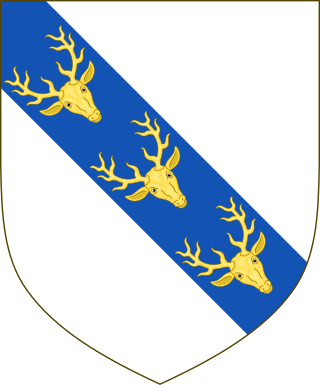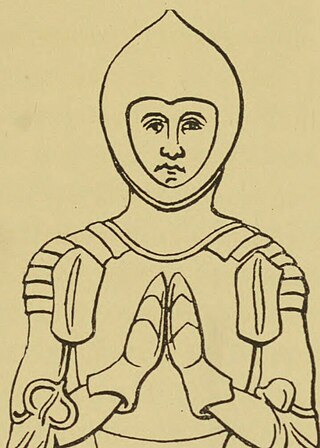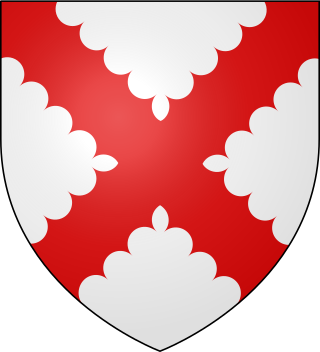Related Research Articles
The Treasurer of the Household is a member of the Royal Household of the Sovereign of the United Kingdom. The position is usually held by one of the government deputy Chief Whips in the House of Commons. The current holder of the office is Mark Tami MP.

Sir John Stanley, KG of Lathom, near Ormskirk in Lancashire, was Lord Lieutenant of Ireland and titular King of Mann, the first of that name. He married a wealthy heiress, Isabel Lathom, which, combined with his own great abilities, allowed him to rise above the usual status of a younger son.

Walter Hungerford, 1st Baron Hungerford was an English knight and landowner, from 1400 to 1414 a Member of the House of Commons, of which he became Speaker, then was an Admiral and peer.

Thomas Chaucer was an English courtier and politician. The son of the poet Geoffrey Chaucer and his wife Philippa Roet, Thomas was linked socially and by family to senior members of the English nobility, though he was himself a commoner. Elected fifteen times to the Parliament of England, he was Speaker of the House of Commons for five parliaments in the early 15th century.

John Tiptoft, 1st Baron Tiptoft was a Knight of the Shire for Huntingdonshire and Somerset, Speaker of the House of Commons, Treasurer of the Household, Chief Butler of England, Treasurer of the Exchequer and Seneschal of Landes and Aquitaine.

The King's Wardrobe, together with the Chamber, made up the personal part of medieval English government known as the King's household. Originally the room where the king's clothes, armour, and treasure were stored, the term was expanded to describe both its contents and the department of clerks who ran it. Early in the reign of Henry III the Wardrobe emerged out of the fragmentation of the Curia Regis to become the chief administrative and accounting department of the Household. The Wardrobe received regular block grants from the Exchequer for much of its history; in addition, however, the wardrobe treasure of gold and jewels enabled the king to make secret and rapid payments to fund his diplomatic and military operations, and for a time, in the 13th-14th centuries, it eclipsed the Exchequer as the chief spending department of central government.
Sir Peter Buckton was an English politician, soldier and knight from the eponymous village of Buckton near the town of Bridlington in Yorkshire. He was the High Sheriff of Yorkshire for the year 1404 and was also a member of parliament for Yorkshire three times. In the latter years of his life he also held significant positions such as the Mayor of Bordeaux and Ambassador to Castile.
The Sheriff of Nottinghamshire, Derbyshire and the Royal Forests is a position established by the Normans in England.
Sir Walter Beauchamp was an English lawyer who was Speaker of the House of Commons of England between March and May 1416.
Roger Flower or Flore was an English politician, twelve times MP for Rutland and four times Speaker of the House of Commons.

Sir Richard Vernon was an English landowner, MP and speaker of the House of Commons.
John Wilcotes, of Great Tew, Oxfordshire, was an English politician.
John Leventhorpe, of Sawbridgeworth, Hertfordshire and Ugley, Essex, was an English politician and one of the executors of both Henry IV's and Henry V's wills.
Robert Waterton was a trusted servant of the House of Lancaster under three monarchs, Henry IV, Henry V, and Henry VI. As Constable of Pontefract Castle, he had custody of Richard II after that king was deposed.
Sir Hugh Waterton, was a trusted servant of the House of Lancaster.
Sir Roger Fiennes (1384–1449) was an English knight of the shire, High Sheriff of Surrey and Sussex, and builder of Herstmonceux Castle. He was also Treasurer of King Henry VI's household.
Henry Somer was a mediaeval English courtier and Member of Parliament who was Chancellor of the Exchequer. Somer's tenure as Chancellor occurred during the Great Bullion Famine and the beginning of the Great Slump in England.
Sir John Cockayne was an English soldier, politician and landowner whose wealth made him a major force in the affairs of Derbyshire under the House of Lancaster. After numerous acts of criminality in concert with other Midlands landowners, he became a member of the Lancastrian affinity centred on John of Gaunt and a supporter of Henry IV. He fought in two campaigns of the Hundred Years War but his violence and lawlessness continued and he was decidedly out of favour during the reign of Henry V. With power less concentrated in the early years of Henry VI, he was able to serve three terms as High Sheriff of Nottinghamshire, Derbyshire and the Royal Forests and to wield considerable power and influence. He represented Derbyshire no less than nine times and Warwickshire twice in the House of Commons of England.
Sir John de Pelham was an English parliamentarian who served as Treasurer of England.
John Wodehouse was an English administrator and politician who served as Chancellor of the Duchy of Lancaster from 1413 to 1424 and as Chamberlain of the Exchequer from 1415 until his death in 1431. He was an ancestor of the Wodehouse family.
References
- ↑ "Leche, Roger (d.1416), of Chatsworth and Nether Haddon, Derbys., History of Parliament Online" . Retrieved 3 September 2016.
